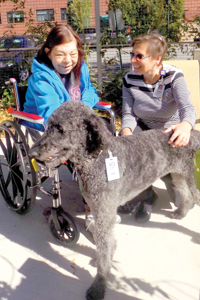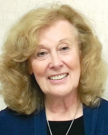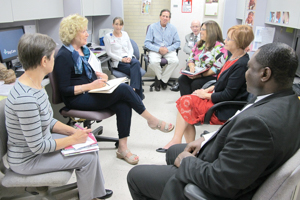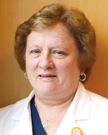Who am I? Knowledge of individual is key to care
By BETSY TAYLOR
When Dr. Keith Veselik, a pediatrician and internist at Loyola University Medical Center in Maywood, Ill., educates medical students, he has them read a well-known study that found doctors, on average, only listen to patients for 18 seconds before interrupting them. Veselik believes effective doctors actively listen to patients, hear their concerns and work to address factors that affect their care.

Knowing that Beverly Albertasis, left, loves animals, Debbie Scionti brings Aimee the therapy dog to visit Albertasis at the MI Nursing/Restorative Center in Lawrence, Mass. Scionti directs mission integration for Mary Immaculate Health/Care Services.
Even so, even he needs the occasional reminder about the importance of really knowing who his patients are and what they want for themselves. In one instance, he was caring for a patient he'd treated for 20 years. And he'd cared for and known other members of the man's family. The patient, Joe, had diabetes and heart and vascular disease and was requiring frequent hospitalizations. A nurse care coordinator, Margaret Bower, suggested to the doctor that he ask Joe what he wanted for himself. Veselik recalls thinking that he was pretty sure he knew what Joe wanted, but the doctor asked Joe his "number one goal." Joe said he "never wanted to be in a hospital or an emergency room ever again." He said he'd raised his children and lived to see his grandchildren grow up.
"It was a conversation no one had had," Veselik recalled. He arranged home care for Joe, and a few weeks later, Joe decided to begin hospice care. Joe died at home, which was what he wanted, the doctor said.

Veselik
Ministry experts say that every aspect of a patient's care — physical, spiritual and emotional — can be improved by knowing the patient's treatment goals and what he or she values. There are varied ways that clinicians elicit and share that information.
Who, what, how
Jennifer Paquette directs pastoral care for the St. Joseph's Hospitals in Tampa, Fla. She works with seven entities that are part of BayCare Health System. She said clinical data tells "how" the patient is. Personal and psychosocial data provides a snapshot of "what" the person is — information including where he works, if he has kids, his religion.
But ministering to a person in a Catholic health care setting means understanding the "who" of a person, understanding the person's identity, "the substance of how they are known and wish to be known," she said.
Paquette often asks patients open-ended questions, and encourages clinicians to do the same. These can be as simple as, "What is most important to you today? What's in your heart today?"

Paquette
She said a doctor or nurse may tell a chaplain a patient is upset because of, say, the patient's worrisome medical diagnosis, but a question may reveal something else that's causing that person spiritual distress, such as a patient just learning of a granddaughter's drug addiction.
Paquette said care providers sometimes make faulty assumptions based on generalizations about what patients need or want. Needs and desires vary greatly from person to person. "How do we know we really spoke to that patient, and not to the patient in the next bed?" she said. "Who we are as a person really determines how we will approach our disease state, our illness and how we will recover, what options we choose to take."
In addition to asking open-ended questions of a patient, she also encourages clinicians to read reports from chaplains in the patient's electronic health record. Those notes can provide insight into a patient's identity and emotions, and that information can provide more context for the patient's goals for treatment.
By popular demand
Stacey Sumereau is the coordinator of program services for the Avila Institute of Gerontology in Germantown, N.Y. The institute is the education arm of the Carmelite Sisters for the Aged and Infirm, which provides education for health care professionals who work with elders. Sumereau educates staff at nursing homes about how to interview a patient to gather information that can be used to add comfort and joy to the patient's daily life. The technique includes questions about the person's background, family, job history and personal preferences. Ideally, the resulting profiles capture what the individual finds meaning in and enjoys, whether it's praying the rosary daily, making art or listening to music.
Sumereau teaches staff development directors or activities directors at long-term care facilities, who then send her completed patient profiles. She compiles the information using FileMaker software. From there, she can analyze the data to see if a given facility's residents have common interests that could be addressed through a group activity or program. She checks with on-site staff to make sure what the data suggests holds promise in their care setting.
"You think bingo will be popular, but maybe only three residents like bingo," she said. The data may indicate craft activities would be a hit, but the staff will know what modifications might be necessary to include people with visual impairments. A group of people who all like reading mysteries may not be a good fit for a book club if a few of them don't enjoy spending time with one another.
Tailoring to the individual
Mary Immaculate Health/Care Services in Lawrence, Mass., is part of Covenant Health. Debbie Scionti, Mary Immaculate's director of mission integration and spiritual care, works with employees and residents of an organization that has about 800 people in short-term rehabilitation, adult day care programs, independent living, assisted living, skilled nursing and memory care.

Members of St. Joseph's Hospitals pastoral care team gather during a recent meeting. They are, from left, Jan Hoyt, Jennifer Paquette, Briana Whaley, Fr. Victor Bartolotta, Bee Kirk, Karen Cappello, Susan Hill and Fr. Lawrence Ahyuwa.
When a person begins a program at Mary Immaculate, or moves into one of its residences, he or she is asked about preferences.
Mary Immaculate then works to incorporate those preferences into the individual's daily routine. An animal lover may get a visit from Scionti with her therapy dog, Aimee. Care at Mary Immaculate facilities is "about the human person, and with more understanding of who they have been, we honor who they are today," Scionti said. Some of the preferences are first noted by observant staff. For example, a resident, who is not a native English speaker, is always given an extra dish to place her tea bag on after she steeps her tea, because early on she gestured that she wanted one, and it appeared important to her.
Scionti said at Mary Immaculate all care providers are encouraged to speak up on a patient's behalf. She said certified nursing assistants, who usually assist residents with basic needs including showering and toileting, often know residents very well, and Mary Immaculate wants to foster an environment where they are comfortable passing along a patient's preferences.
Team approach
In his group medical practice, Veselik said a patient's electronic medical record includes a longitudinal plan of care, with patient-stated goals. A longitudinal plan often contains information relevant to the patient's care beyond that person's health data.
He said if a patient is trying to attend a granddaughter's wedding in six weeks, a clinician can share that in the record, and that clinician and others make care decisions accordingly, perhaps timing tests and treatments to try to ensure the patient is able to enjoy the wedding. His group practice includes eight physicians, a nurse practitioner, a nurse care coordinator and a medical assistant. The group practice plans to add the services of a social worker, psychologist and pharmacist, any one of whom could build on what is known about the patient's life and its relevance to care outcomes.
Veselik said many clinicians do want to get to know their patients better. He finds a team approach to building that foundational narrative eases demands on any one care provider's time, allowing clinicians to strive for more personal connections with patients. "I think the pendulum is swinging back that way a little bit."
|
Tapping into procedural memory of memory impaired
When caring for a person who is memory impaired in a long-term care facility, the staff's ability to accommodate the individual's personal preferences makes a vital difference to the resident's quality of life, said Sr. M. Peter Lillian Di Maria, O. Carm. She directs the Avila Institute of Gerontology in Germantown, N.Y., which educates health care professionals who work with elderly populations.
"You can create behavioral problems by just assuming someone would be fine with something," she said. With that in mind, a staff person at a facility should gather information on a resident's past, including the person's occupation, the person's interests and their every-day preferences and dislikes related to how they live.
Al Norwood, a behavioral specialist with the Avila Institute,
said people go through life subconsciously predicting what will happen next, based on the experiences they've had. When the brain can no longer automatically predict what will happen next, as gradually occurs to someone with dementia, the person becomes stressed. But when presented with activities that use skills and habits, learned through repetition, which are retained in dementia, fear of "what will happen next" and resulting stress can be minimized. To soothe that person, it helps to know what he or she repeatedly did previously in life, such as skills or tasks they performed regularly during their working lives. "You're trying to find things that are not novel," Norwood said.
In one instance, he said, he brought a bookkeeping ledger for use by a woman in a care facility who'd made her living as an accountant. In the morning, when she had her coffee, she'd avoid the stress of not knowing "what would happen next" by writing in her ledger, and it soothed her.
Staff of the Avila Institute encourage care facility leadership to free up staff to learn about their residents, and to have communication channels in place, so that other staff can learn about each resident's past and preferences that are relevant to their care.
|
Accommodating the habits of patients with Alzheimer's reduces stress of inpatient stay
By RENEE STOVSKY
A hospital stay can be disorienting for any patient. Unfamiliar routines, lack of privacy, interrupted sleep, multiple caregivers — plus the discomfort caused by the acute condition that required hospitalization to begin with — can cause unease, exhaustion and impatience for even those accustomed to medical procedures.
For a growing number of elderly patients with dementia, though, a hospital stay can be much more difficult. A change in environment, coupled with different shifts of medical personnel, frightening tests and equipment, even strange food, can lead to true trauma.
In turn, that leads to difficult behaviors, says geriatric specialist Marty Pond of St. Joseph's Hospital Health Center in Syracuse, N.Y., who is a nurse with a master's degree focusing on Alzheimer's disease.

Pond
"Patients with dementia tend to act out in order to maintain some sense of self-control," she says. "Their behaviors run the gamut from simple restlessness and resistance to personal care to more problematic conduct like trying to climb out of bed, pulling at tubes, IV lines and dressings, wandering and becoming belligerent or even violent toward staff."
Tapping the family
Three years ago, Pond put a multidisciplinary plan in place at St. Joseph's to provide more individualized care for patients with dementia and, hopefully, better manage outcomes for them as well.
"Dementia is usually not the primary diagnosis for these patients — often it is pneumonia or a urinary tract infection — but their cognitive confusion can impact acute care treatment," she says.
The first line of defense in treating patients who have dementia is the family, she says. They are the most acquainted with typical routines, likes and dislikes, sources of agitation and effective ways to calm parents or grandparents.
'About Me'
Pond has trained nurses to ask family members to fill out a single sheet called "About Me" when patients are admitted. Answers to the questionnaire include information that can help customize care as well as "honor who the patient is and what brings them joy," she says.
Typical questions include the following: Who are the important people in this patient's life? What does the patient like to reminisce about? What was his or her life's work, hobbies and talent? What are some favorite movies, TV shows, and musical preferences? Preferred foods and beverages? And, perhaps most important, what are the patient's daily routines — sleep habits, quiet times, bathing preferences and so on?
"Our goal is to make the hospital environment as much as possible like the home environment, whether the patient actually lives at home or in an assisted living or memory care facility," says Pond.
Day and night
To that end, nurses will try to fashion a patient's day to mimic life outside the hospital. If a patient is an early bird who is used to rising at 5 a.m., for example, Pond will suggest that the nursing staff get him or her up at 4:30 a.m., take care of basic needs, including bathing, administer medications and get the patient settled in time for a favorite morning news show before breakfast. Similarly, if the patient is used to staying up until midnight, efforts are made to secure a private room where he or she can follow a more nocturnal routine.
To occupy a patient's time, Pond will often have books or movies on hand for caregivers to distribute that appeal to individual interests, be it animal books for pet lovers, Broadway shows for music lovers, or documentaries about world's fairs for history lovers.
For more difficult patients who become restless or agitated, Pond has even provided "projects" that staff members can use to occupy and soothe them. For instance, to keep a former electrician busy, Pond went to the hospital's facilities department and made a board of colored wires. The man happily moved the wires from one peg to another, self-calming in the process. Another patient, a former elementary school teacher, spent days staying busy by grading arithmetic and alphabet papers with red pens and stickers.
"Not everything needs to be so time intensive," says Pond. "Sometimes just knowing little things — Does the patient drink tea or coffee? Can he or she swallow pills easily or does a spoonful of applesauce help? — can make a big difference."
Familiar faces
Family members are often enlisted to help with care as well.
"Many patients get lonely and just want someone to sit with them," says Pond. "Often we ask families to stagger visits, or come at sundown, when patients can become more confused. They respond better to familiar faces."
As much as possible, Pond also tries to have regular caregivers for patients, despite changing shifts. "Consistency and routine are crucial to helping patients with dementia cope with hospital stays," she says.
In addition to the nursing staff, Pond also advocates for pharmacists; social workers; physical, occupational and speech therapists; and spiritual advisers to join in the multidisciplinary care of patients with dementia.
"We like to have pharmacists review all present and past prescription medications for proper dosages and side effects, as well as PRN medications that might be effective," she says. (PRN medications are those that are taken as needed.) "If rehabilitation is required, we set realistic goals with PT and OT. If psychiatric services are needed, we get the proper physicians and geriatricians involved. We offer support to patients and family through spiritual care and social work. And we have case managers to handle discharge plans so that families and long-term care facilities can help patients get back to functioning in their regular environments as well."
Power of habit
"Marty is on call to the staff, reassessing situations and offering alternative suggestions to manage behavior when regular protocols fail," says Sarah Tubbert, director of clinical services at St. Joseph's.
"We know our best intervention is to keep familiar routines for patients with dementia. An acute care setting is a different routine, and it can lead to further confusion for those patients," says Tubbert. "Marty is creative about making accommodations for individualized care."
Tubbert adds that Pond's innovative multidisciplinary approach has resulted in a "win-win situation for patients, their families and the staff.
"We are able to maintain a safe environment while delivering quality care — often with a decreased length of stay in the hospital," says Tubbert. "With a rapidly increasing senior population, the impact of this kind of approach can prove to be a really big deal."
Copyright © 2016 by the Catholic Health Association
of the United States
For reprint permission, contact Betty Crosby or call (314) 253-3477.